Israel vs. Hamas war
The key question in this current war approaching apocalyptic dimensions, is this:
local crisis or Black Swan of coming conflagration.
Overall picture – Chain of events
While the Israelis were spending sabbath and the last day of the “Sukkot holiday”, which is one of the Jewish festivals, they faced the surprise operation by the Palestinian resistance. Residents of the areas near the Gaza Strip and those, who had gone there on vacation, suddenly found themselves in a nightmarish situation on the Saturday morning of October 7.
Palestinian forces launched a massive offensive against Israel from the Gaza Strip. The clashes started with massive rocket attacks (about 3000 rockets) by Palestinians against Israeli settlements and ground attacks on several settlements, installations and Israeli military bases. Palestinians passed the barrier of the security guards of the Gaza Strip and entered the settlements and military facilities in the occupied territories. Particularly, in the early phase of this operation, Palestinian fighters committed horrific atrocities.
At the beginning of the operation, codenamed “Operation Al-Aqsa Flood,” Hamas and its allies fired thousands of rockets and suicide drones from the Gaza Strip into southern and central Israel. Simultaneously, around 1,000 Palestinian fighters infiltrated Israel from Gaza using trucks, pickup trucks, motorcycles, bulldozers, speedboats and paragliders. The fighters stormed a number of military posts, then clashed with Israeli troops and security forces.
Prime Minister Benjamin Netanyahu said that “Israel was at war” after Palestinian armed factions in the Gaza Strip started a surprise large-scale attack. The high-level security cabinet decision gives the war declaration (Basic Law/The Government, which in its Clause 40 says that the country cannot go to war without a government decision). This was the first time Clause 40 was invoked by the Israeli government since the 1973 Yom Kippur War with Egypt and Syria.
With the approval of the state of war, Article 40 of the Israeli Constitution was activated. In such a case, the Israeli army has full freedom of action to carry out extensive military actions and use all the power of its air, land and sea forces in any place and can act independently at its discretion.
Israel’s operation, which started in response to Palestinian attacks, was named “Iron Swords”.
On the first day of the war, which was accompanied by the element of surprise, the Palestinian forces managed to penetrate to a depth of 20 kilometers in the areas controlled by Israel. Palestinian forces were able to take control of the Karam Abu Salem crossing, which is the only active crossing of the Gaza Strip. The numerous settlements and even some military bases were captured by Palestinian forces. Palestinians entered the important cities of Sderot, Netivot and even Ashkelon.
The scale of attacks and the Israeli casualties were so surprising that the Israeli army was forced to withdrew from the areas around Gaza on the first day of the fighting to prevent an increase in casualties. On the second day of the war, however, the Israeli army, which had now come out of surprise, sent armored equipment and troops to the southern regions and carried out a series of counter-attacks against the Palestinian forces. During the battles of the second day, the Israeli army succeeded to a large extent to deal with the guerrilla attacks of the resistance forces that penetrated to a depth of 20 kilometers in the territories controlled by Israel and pushed them back.
On Sunday, Israeli Defense Forces (IDF) started massive and intensive air strikes and bombings on Gaza region, which IDF has resumed on daily bases. The numbers of victims are rapidly growing day by day on both sides: killed over 1000 people on both sides, wounded several thousand on both sides, material damages are massive especially in Gaza region. Accurate information on the number of people captured by the Palestinians is not available but it is said that at least 100 Israelis have been captured in recent days.
October 10, The Palestinian movement Hamas has informed all interested parties that it does not plan to engage in talks about the fate of its Israeli hostages as long as fighting continues, Hamas political bureau chief Ismail Haniyeh said.
The Defense Minister of Israel declared that he had ordered a complete siege on the Gaza Strip. “There will be no electricity, no food, no fuel, everything should be closed. We are fighting human animals and we act accordingly,” he said.
The battle between the IDF and Palestinian factions could go on for weeks or even months. Once Gaza borders are cleared, the Israeli military will likely attempt to invade the strip, in other words the ground operation in Gaza Strip itself.
Operative military performance can be found here below in those videos by Military Summary:
Gaza Launches Special Military Operation Against Israel. Military Summary And Analysis For 2023.10.7
WW3 | Israel Strikes Back. Palestinians Retreat to Gaza. Military Summary And Analysis For 2023.10.8
WW3 | Carpet Bombing Of Gaza. Escalation With Hezbollah. Military Summary And Analysis For 2023.10.9
Eternal War| Humanitarian Catastrophe And Escalation In The Middle East. Military Summary 2023.10.13
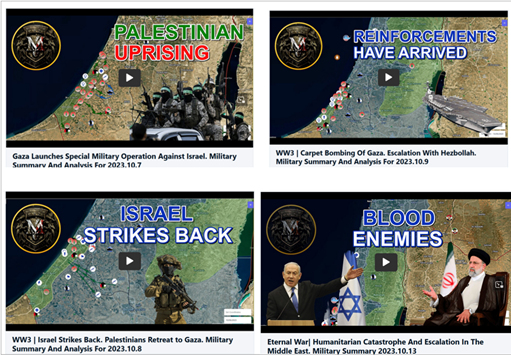
Next phase of this incident, a ground operation by IDF in Gaza Strip, is now expected in the near future.
Failure of Israeli Intelligence
What is more important, in this incident, than the operational and military victory of both parties, is the intelligence failure of Israel’s security institutions.
While the commanders of the Palestinian resistance had been planning and preparing the forces for operations for a long time, the Israeli intelligence agencies remained oblivious to these plans and movements and despite the Israeli media’s claim of 24-hour surveillance of resistance commanders and 100% intelligence control over Palestinian groups, Israeli military institutions failed to counter these attacks.
One of the main reasons for the success of combined Palestinian attacks against Israel has been that Hamas managed to hide the intentions and performance of their security and military units so well. Of course, transferring the experiences of the previous battle, also shows the improvement of strategic cooperation between Hamas, Islamic Jihad and other groups in this field. It should be noted that the Palestinian attacks on Israel around Gaza began after months of bloody conflict between Israelis and Palestinians, including clashes in Jenin and al-Aqsa Mosque but Hamas itself had a low profile in those conflicts.
There are number of Israeli security agencies like Mossad, Shin Bet and Unit 8200, which all failed to recognize the real danger of this operation, although Egypt security authorities have reportedly warned Israeli authorities in advance. That means that Mossad did not find the report credible or ignored it. Sometimes that does happen in these intelligence organizations, the question is of human incompetence.
Hamas’ assault was a surprise not only in terms of its unexpected nature but also in terms of the unprecedented events that accompanied the assault: Israel’s intelligence community’s failure to anticipate the attack, Israel’s military’s initial lack of an effective rapid response and the unexpected success of militias in the early hours. IDF had moved several battalions of forces from Gaza region to the West Bank, thus there was a temporary lack of suitable Israeli forces to resist Hamas attack.
Besides deficiency in troops, the massive electronic control system built in the border zone of Gaza in order to prevent Hamas tunnel excavation and attacks via tunnels, failed badly to warn IDF.
in recent years, Israel’s intelligence community has been largely focused on Iran and its borders with Syria and Lebanon. Essentially, Israelis have been using their espionage capability primarily to counter the development of Iran’s nuclear and ballistic programs and secondarily to prevent the transfer of advanced military equipment from Iran to Hezbollah in Lebanon via Syria.
In this context, one might argue that Hamas and its backers, mainly Iran and Hezbollah, were counting on this diversion and have been attempting to exacerbate it. Israel’s intelligence community failed to see the growing power of Hamas and to anticipate the attack. One of IDF’s primary advantages, the element of surprise to achieve “strategic paralysis”, was taken by Hamas.
In order to add the “tactical paralysis” Israel faced, the Palestinians employed a Blitzkrieg-like strategy, focusing their forces on specific entry points, then rapidly advancing, followed by periodic outbreaks behind Israel’s defense lines. Additionally, Hamas seems to have attempted to create chaos among the public and distract the Israeli military by launching attacks from the sea using boats and motor-powered hang gliders.
Hamas’s tactical innovations also included the use of new weaponry and the projection of unprecedented firepower. Hamas realized that while they couldn’t out-tech the Iron Dome, they might outpace its reloading capabilities. By concentrating their fire, launching hundreds of rockets, shells, and kamikaze drones towards Israeli territory, they hoped to overload the Iron Dome’s capacities. Their success in this respect seems to be achieved partly.
In this conflict, Hamas appears to be trying to neutralize one of Israel’s major advantages: aerial superiority, by taking over 100 Israelis hostage. While the primary objective of taking hostages is likely to use them as bargaining chips in future negotiations – as Hamas leadership already stated that they have enough hostages to free all Palestinian prisoners.
By and large, intelligence failures can take place in many ways like lack of sources and information, relevant information was collected but not read, the analysts may dismiss it as not relevant, the analysts tried to warn their bosses but the analysis was shut down or the intelligence service warned the political leaders but the warning was ignored.
Israel got a warning from Egypt of potential violence three days before Hamas caught Israeli forces off-guard in a large-scale attack, the chairman of the powerful US House Foreign Affairs Committee said Wednesday. Hamas’ ability to remain undetected while preparing and launching such a big, complex assault from the closely monitored and heavily guarded Gaza strip represents an unprecedented intelligence failure for US ally Israel.
At the end of the day, despite that all said above, the asymmetrical military capability between Israel and Hamas remains evident. The IDF has absolute superiority in every domain, prompting the question: Why was the assault even launched? As days go by, we may get closer to answering this. For now, it seems Hamas hopes that by leveraging the hostages, they can press Israel to ease restrictions on the Gaza Strip or release prisoners.
Impacts in the wider context – escalation risk
Regional context
The strategy outlined by Netanyahu now is the following: Liberate the territories lost so far; Reinforce external borders and potential crisis areas to prevent other actors from joining the war; Make those responsible pay an exorbitant price. The first two has been made thus far (October 15), the third one is in the making in the form IDF ground operation in Gaza Strip. The potential for a wider conflict exists. The main question is, what will happen when the IDF enters the Gaza perimeter and what other actors will mobilize.
The biggest challenge to Israel will be the possible five-fronts war: Hamas & Gaza, Hezbollah & Lebanon, Syria, Iran and Palestinian militants in the West Bank.
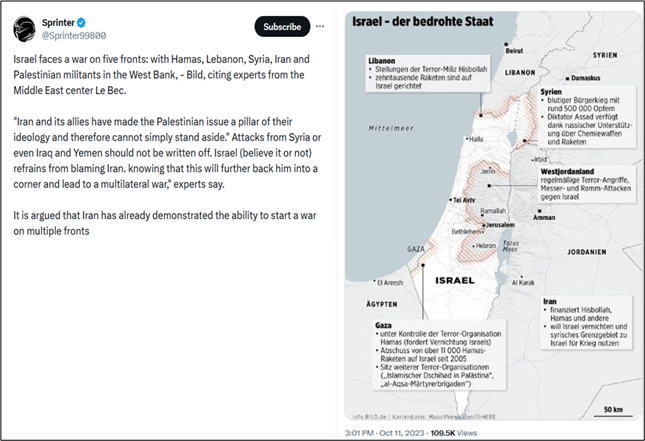
In this situation, it should be seen what measures Hamas forces have prepared to deal with possible Israeli operations. Is there another surprise like the entry of Hezbollah and the Syrian resistance forces into the Palestinian war? Will the next surprise happen in the West Bank and the West Bank Palestinians will start a new military operation against Israel? Or the battle in the Gaza Strip will finally subside with the mediation of the Arab countries to a ceasefire?
The big war in the Middle East is taking shape and those responsible for it are being appointed. Iran helped Hamas plan an attack on Israel and launched the invasion. The Western media (WJS and others) are beginning to form public opinion that Tehran was behind the Hamas attack on the Israeli civilian population. Allegedly, representatives of the Iranian intelligence services gave permission for it to be held during a meeting in Beirut in early October. Iran has postponed other regional conflicts, in particular the confrontation with Saudi Arabia in Yemen, in order to direct the resources of the IRGC to coordinate, finance and arm Hamas and Hezbollah.
Hezbollah has attacked a number of Israeli military posts on the Lebanon-Palestine border using artillery fire and anti-armor guided missiles and Israeli aircraft also attacked a number of positions of Hezbollah near the borders. So far, Hezbollah has not made any ground advance but if the tensions escalate, there is a possibility of Hezbollah entering the war. One of the crucial turning points now will be the reaction of Hezbollah in the north.
Lebanese Major General Abbas Ibrahim: The decision has been made to open all fronts, if Israel dares to enter the Gaza Strip by force, October 11.
Iran, meanwhile, has been on the defensive mood after major US media, especially the Wall Street Journal, cited US sources, who alleged Tehran supported, funded and helped plan Hamas’ deadly operation. There’s speculation that the Iranians fear Israel’s Netanyahu government could begin targeting sites inside Iran. Iran’s ayatollah Ali Khamenei said Iran was not involved in the Hamas attack on Israel but hailed what he called Israel’s “irreparable” military and intelligence defeat.
According to Iran TV, “American officials have been threatening Iran as well.” Iran issues Stark Warning to Israel and the United States. “Any foolish Israeli action against Iran will be met with a devastating response. The American’s know quite well they have already bitten off more than they can chew. They are not the powers they were 30-40 years ago. The United States is VERY VULNERABLE.”
Iranian President Ebrahim Raisi and Saudi Arabian Crown Prince Mohammed bin Salman had a phone call, discussing Palestine, on October 11. This is their first phone call ever which took place around 45 minutes. They discussed Muslim countries unity in the face of developments in Palestine. Iranian Foreign Minister Hossein Amir-Abdollahian issues PUBLIC WARNING to Israel, October 12. “If Israel does not stop its attacks on civilians in Gaza, the region will face NEW situations.”
Syrian Army has fired missiles toward the Israeli-occupied Golan Heights on Tuesday evening, October 10. The IDF have confirmed the attack. This raises the risk of a broader conflict which spirals, given the earlier exchange of fire in northern Lebanon between Israel and likely Hezbollah positions. Al Jazeera writes on the significance of the Golan mortar fire from Syria. It seems to be a kind of contained tension. Lebanon is not yet a war zone. However, it’s an area of operation.
Jordan officially supports Palestine, Jordanian King, October 10, said: “We will not deviate from defending the just cause of the Palestinian people until they regain their full rights.” “The Palestinian people must obtain their independent, sovereign state on the 1967 borders” “There is no peace or stability without a just and comprehensive peace and the Palestinian people’s access to their rights”
On the other hand, Iraqi resistance groups in solidarity with Palestine also warned Israel. In a message, while inviting the nation of Iraq to participate in the million marches in support of Palestine, warned the governments supporting Israel that, if they seek to expand the scope of the war, they will face the epic of resistance. The Iraqi resistance group also issued a statement and warned United States and Israel in the event of direct American intervention in the Gaza war, all American positions in the region will become legitimate targets of the resistance axis.
October 12, Palestinian President Mahmoud Abbas, which has held a low profile during his event, stated that it is necessary to move to political action to end the Israeli occupation and achieve peace. He also calls for Gaza to be provided with water and electricity and humanitarian corridors to be opened. Blinken announced that he will travel to Jordan to meet with Palestinian President Mahmoud Abbas.
Thus far, Egypt has taken a neutral stance in their public statements. Reportedly, Egyptian security unit warned Israeli security authorities in advance of coming Hamas attack. According to Israeli media, Cairo warned Tel Aviv not to occupy the Gaza Strip. Possible retaliation ranges from generic “consequences” to predicting Hezbollah’s entry into the conflict.
Even Saudi Arabia joins the Turkish-Egyptian position of calling for “an immediate de-escalation”, while assigning full responsibility to Israel for what has happened. According to the Jerusalem Post, Saudi Arabia has decided to end negotiations on normalizing relations with Israel. The Saudis, Egypt, Iran, Russia and China began to act in a single logic on the Palestinian issue. If the Saudis throw their weight behind this, the pressure on Israel will increase in every sense. That this is happening now is also a result of the geopolitical situation in the Persian Gulf, which has weakened Israel’s position. Saudi-Iranian normalization made clear that the time would soon come for Tel Aviv to choose between difficult options.
Meanwhile, the Arab League announced an emergency meeting for Wednesday, October 11. Foreign ministers from Arab League member countries were scheduled to discuss strategies aimed at de-escalating the conflict and preventing additional harm to civilians.
The European and North American governments issued statements of unconditional support for Israel. Ukraine supports Israel as well, while Russia and China urge for immediate de-escalation. President Biden in a speech confirmed that the US will begin “surging” defense aid to Israel. Meanwhile, various countries have begun evacuation efforts of their citizens from Tel Aviv.
In the midst of these developments, the US command in the region (CENTCOM) released a statement and announced that the US military will move a number of its warships and aircraft carriers to the eastern Mediterranean Sea and threatened that “USCENTCOM stands firmly with Israeli and regional partners to address the risks of any party seeking to expand the conflict.” This US move is clearly a message to the countries that are friends with Palestine.
The Pentagon has warned both Iran and Hezbollah against jumping into the conflict in a fresh statement: While there are yet no indicators that the US will conduct anything other than a “show of support” with the naval hardware dispatched near Israel, it will certainly be in a position to conduct some level of active intervention on Israel’s side if ordered by the White House.
British Foreign Secretary James Cleverley, October 10, said, according to The Guardian, that “We have found no link between Iran and Hamas operations”. Announcing renewed support for Israel, he stressed that no link had been found between Hamas operations and Iran. The connection between Hamas and Iran is well known but like the US, Britain has no information to assess whether Iran was directly involved in the attacks or not.
By and large, American relative position has weakened in the Middle East, while both China and Russia have strengthened their posture in last four years, China through BRI and Russia supporting Syria. Many countries like Russia, Turkey, China, Egypt and Jordan have stated that the crisis can only be resolved by the creation of an independent Palestinian state. The more Israel destroys Gaza, the more countries will push for the creation of an independent Palestine.
Politico writes, October 10, “Although Putin did not incite this crisis, he is now happy to add fuel to the fire and turn everything in his favor. The war in the Middle East is a victory for Russia and the money for Ukraine will dry up”. Politico notes that Moscow has long been “sympathetic to Islamist militants,” and Ismail Haniyeh and other Hamas leaders recently visited Moscow. The Hamas attack on Israel was a real gift for Putin, Politico writes.
Turkey’s position is interesting
Palestinian Hamas offensive into Israeli held territory may raise the possibility of escalation into a wider regional conflict. While assessments of the possibility of escalation have primarily focused on the possibility of Iran or the US being drawn into war to support Hezbollah or Israel respectively, it may be perhaps more likely that another outcome may emerge.
Namely NATO’s sole Middle Eastern member state, Turkey, could be drawn into the conflict and surprisingly on the side of Israel. Turkey is the only state actor other than Israel to have engaged in combat operations against Hezbollah since the 1980s and continues to place northern Syria’s Idlib governate under its influence through support for a wide range of jihadist insurgent groups such as the Al Nusra Front and East Turkestan Islamic Party.
These were at the forefront of Turkish and Western efforts to overthrow the Syrian government in the 2010s, which Hezbollah and later Iran and Russia intervened to thwart the operations of Turkey’s backed militants from an enclave close the Turkish border. While these groups have launched multiple attacks against Syrian and Russian targets into the 2020s and frequently clashed with Hezbollah units as well, the escalation of Hezbollah-Israeli hostilities could provide an optimal opportunity for them with Ankara’s backing to press into Syria and thus join the war effort.
Turkey and Israel have a long history of strategic partnership both within and outside the framework of Ankara’s position as a leading regional NATO member and now the two also share common adversaries in Hezbollah, Syria and to a lesser extent Iran.
On the other hand, rapid movements of political tectonics like rapprochement of Turkey, Saudi Arabia and Iran, are changing relations and political games continuously. As an example, of this change, Turkish MPs held a meeting with a Hamas delegation in the Turkish Parliament, October 11. Secret playing behind the scenes can be sometimes very surprising.
Israel-Palestine conflict: an African perspective
Many Africans are, of course, keeping a close eye on the events involving Israel and Palestine. After all, citizens of the African states not only attentively follow worldwide events but also often have a better analytical sense of regional geopolitical processes than a majority of the people in the West. This is particularly true regarding regional affairs in the vicinity of Africa.
Thus, the great majority of people in North Africa traditionally support Palestine. This support is not only based on religious and ethnic considerations but also on a general sense that the Palestinians have been the victims of great injustice over the last few decades.
If looking at sub-Saharan Africa, there are likely to find a wider range of views, based on many different factors, of which religion is just one but also complex. By and large, Muslims tend to feel sympathy towards the Palestinians, while many Protestant churches support Israel. Many countries in sub-Saharan Africa have real historical connection to this issue, which is based on the long solidarity between nations, who engaged in a shared fight for many years. This particularly applies to South Africa, where the ruling African National Congress has long had close links with the Palestinians’ resistance to Israel.
The South African authorities, even today, frequently equate Israel’s policies towards Palestine with the apartheid policy that was for decades imposed by South Africa’s White, Westernized regime on the indigenous majority and other ethnic groups. However, it should be noted that despite the pro-Palestinian position taken by the political elite and much of the population, the South African Jewish community is thriving and is quite comfortable living in the country.
However, the positions taken by the majority of African countries today are based on processes that are characteristic of the multipolar world order.
Europe’s power outage
Politico had an article, October 12, with this headline, “How the Israel-Hamas war exposed the EU’s irrelevance: As global crises intensify, the “geopolitical” Continent is left watching from the sidelines.” The article says further:
“Of the myriad geostrategic illusions that have been destroyed in recent days, the most sobering realization for anyone residing on the Continent should be this: No one cares what Europe thinks. Across an array of global flashpoints, from Nagorno-Karabakh to Kosovo to Israel, Europe has been relegated to the role of a well-meaning NGO, whose humanitarian contributions are welcomed, but is otherwise ignored.”
This crisis indicates, once again that the EU’s global influence is waning, amid the decline of its economy and its inability to project military might at a time of growing global instability. Top foreign policy leadership of the EU (Ursula von der Leyen, Josep Borrell and others) have given contradictory and ambivalent messages both inside and outside. The whole apparatus of the EU’s foreign policy has proved to be impotent and braindead, because top elite of EU are used to be vassals and servants, not patrons and commanders.
Comparing that with the messaging from Washington, the contrast is striking. “In this moment, we must be crystal clear,” US President Joe Biden said on October 12. “We stand with Israel and we will make sure Israel has what it needs to take care of its citizens, defend itself, and respond to this attack.” Biden noted that he had called France, Germany, Italy and the United Kingdom to discuss the crisis. Notably, on the Biden phone list none of the EU’s “leaders.”
Positions of great powers
Position of the US
The scope of Hamas’s attack against Israel was unprecedented and the US response reflects that. “In this moment, we must be crystal clear,” US President Joe Biden said on October 12. “We stand with Israel and we will make sure Israel has what it needs to take care of its citizens, defend itself, and respond to this attack.”
President Biden has said it’s likely American citizens are among hostages taken by Hamas and plans to deploy experts and share intelligence to assist recovery efforts. More broadly, the war has upended the core of his Middle East policy – a new regional security alignment between Israel and Saudi Arabia that would have further isolated Iran.
The US already supplies its ally with $3.8 bn of military aid every year and it has always backed Israel’s right to defend itself, when conflicts with Hamas erupt. But this Hamas offensive will trigger a wide-ranging Israeli campaign and could lead to an escalation in other parts of the region. The US will be part of Israel’s lengthy and punishing response.
The Pentagon has quickly dispatched an aircraft carrier with guided-missile cruisers and destroyers to the waters near Israel, which movement is, first of all, a show of force. The fleet was already in the Mediterranean Sea, so it didn’t have far to go. It is not unusual for the US to deploy naval vessels in the region, when there are flare-ups, a “classic American response” to the unexpected in the Middle East. The Pentagon is now worried the conflict may spread.
A senior defense official said the warships and planes are meant to demonstrate a concrete commitment to Israel’s defense, and to deter any country or militant group from joining the fight. Chiefly that means Iran, which backs Lebanon’s powerful Hezbollah movement, as well as Hamas. The official said the fleet could do everything from gathering intelligence to launching long range strikes. But its deployment is essentially a show of force.
The Biden administration has ordered the Pentagon to send “additional equipment and resources” to Israel. That includes air defense and munitions. Much of this equipment is already in the pipeline from annual US military assistance to Israel and will be fast tracked. Some of it could come from existing US stockpiles.
But Israel’s request for aid on the first day of the war signals how much firepower it expects to use in what it’s signaling is going to be a long war. Further funding would require approval from Congress, which is currently paralyzed by an internal battle over who will be the next Speaker of the House. And it might compete with US commitments to Ukraine. These already stand at more than $46bn since the war there began – although the senior defense official said the US has the resources to support both.
On the other hand, critical voices have emerging in America wondering how long can America support Ukraine, Israel, Taiwan and tens of other countries worldwide. Biden administration has failed in many cases, lost enormous sums of American tax-payers money. Biden and his team have lost the sense of duty to American people.
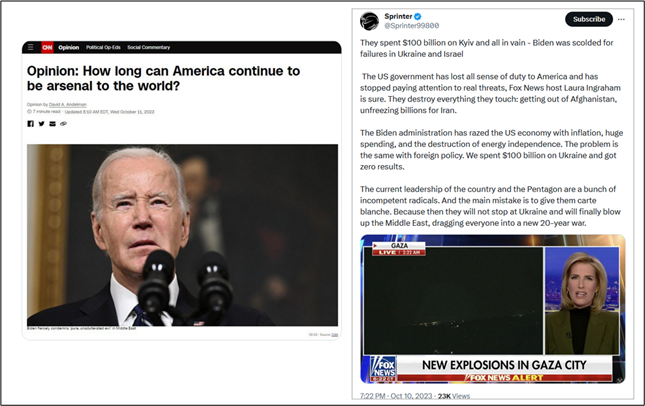
The White House has confirmed that the second American aircraft carrier, the Dwight Eisenhower, is being deployed to the Mediterranean, October 12. This will come in addition of aircraft carrier Gerald R. Ford and her strike group.
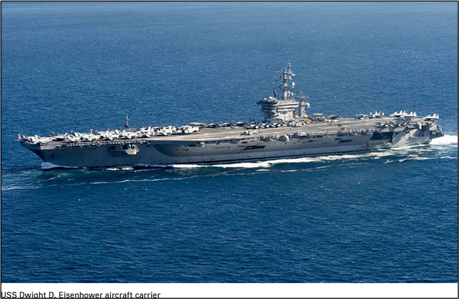
White House National Security Council Coordinator for Strategic Communications John Kirby said that by deploying two aircraft carrier groups into the Mediterranean region “We’re sending a loud and clear message, The United States is ready to take action should any actor hostile to Israel consider trying to escalate or widen this war.”
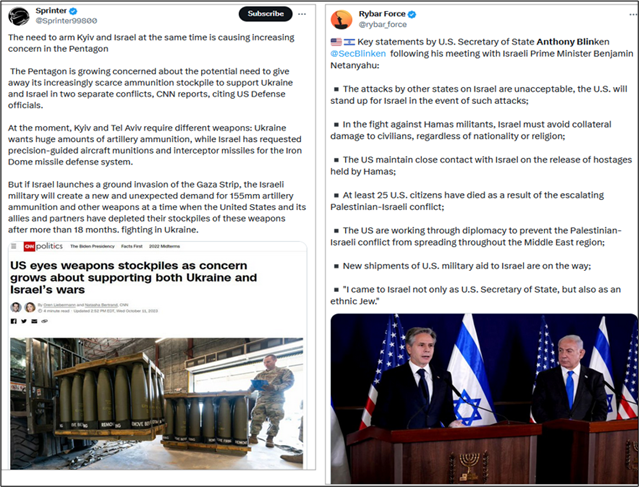
Position of China
In the first couple of days, China’s official attitude has been markedly restrained and cautious, statements have been well-balanced and argued. The casualty data of this round of the Israeli-Palestinian conflict is being updated every day, causing concern and distress for the civilians living in the area.
Global Times, referring to Israeli Defense Minister Yoav Gallant’s statement of a “complete siege” on Gaza where over 2 million Palestinian residents live densely packed”, said “This is a focal point that the international community cannot afford to ignore in the Israeli-Palestinian conflict.” The urgent task facing the international community, especially the major powers, is how to quickly put the brakes on this tragedy and prevent a larger-scale humanitarian catastrophe.
Global Times, October 9, “It must be said that the long-term marginalization of the Palestinian issue by Western countries, particularly the US, is extremely cruel. Western elites often ignore the actual humanitarian disasters while enthusiastically discussing abstract human rights, which is very hypocritical.” US Secretary of State Antony Blinken even openly “advised” Saudi Arabia during a conversation with the Saudi Foreign Minister to “clearly condemn” the attack. To be honest, Washington is not in a position to educate anyone on this issue.
All acts of violence and attacks targeting civilians are unacceptable in any civilized society and must be strongly condemned by the international community, regardless of the perpetrators. When conflicts erupt, the most rational and responsible approach is to call on all parties to exercise maximum restraint and calm and to achieve a ceasefire as soon as possible.
However, in this case, we still see that the words and actions of the US and many Western countries are, in fact, fanning the flames rather than cooling down the situation. This is a consistent pattern for Western countries in many conflict regions, where they often create substantial obstacles to crisis resolution. As a result, this approach only adds fuel to the fire and leads to greater disasters.
Major powers, in particular, have a responsibility to play their role and should take necessary actions to promote dialogue, achieve a ceasefire, and restore peace. Any actions that add fuel to the fire or take sides will only further complicate and hinder the situation. The foundation of the “two-state solution” has been continuously eroded, with relevant United Nations resolutions not being effectively implemented.
These cartoons by Liu Rui are summarizing the Chinese perception of the crisis.
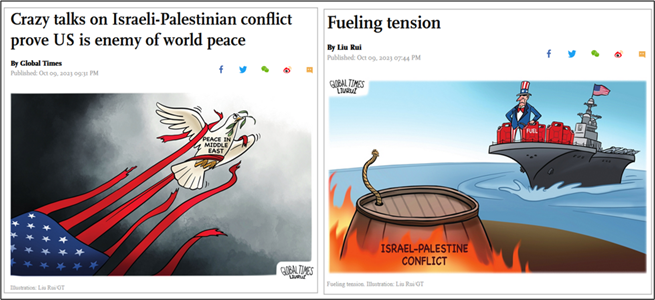
China sees that since the latest bloody conflict broke out between Israel and Palestine, voices calling for restraint or a cease-fire are hard to find in Washington. On the contrary, the US is filled with inflammatory, reckless and crazy talks. While China emphasizes a solution, specifically the “two-state solution,” the US is sending an aircraft carrier strike group to the Mediterranean to be Israel’s cheer leader and is exploiting the conflict by spreading bizarre rhetoric, as if there is no faster way to peace than making crazy talks like “finish them” or hinting a titanic showdown between China and the US.
The Israeli-Palestinian conflict is now at a critical juncture facing a serious escalation, but the US does not show the slightest intention to promote a de-escalation of the situation; it is provoking an escalated slaughter.
According to Chinese analysts, the US’ one-sided support for Israel would neither help put an end to the conflict in the Gaza Strip or make the two sides realize that employing violence to stop violence would just prolong the vicious cycle in the area. Moreover, the feud between Palestine and Israel may intensify as a result of the ongoing conflict.
Israel continues to be driven by rage and retaliation and is adamantly pursuing military action in Gaza. However, it might not achieve the intended security and deterrence and as long as there is no conclusive resolution to the Palestine issue, conflict between Israel and Palestine will continue. Israel-Palestine conflict is worsened because of their asymmetrical strength, making Israel unwilling to reach a settlement. It also has assistance from the US.
Many global and regional powers, including China, Russia and Arab countries are trying to help defuse tensions since more casualties and a more catastrophic humanitarian situation are not what the international community wants to see
On Wednesday, Chinese Foreign Ministry spokesperson Wang Wenbin reiterated China’s stance on the current conflict, saying that to end the cycle of conflict between Palestine and Israel, it is essential to restart the peace talks, implement the two-state solution and seek a comprehensive and proper settlement of the Palestine question through political means at an early date, so that the parties’ legitimate concerns can be taken care of.
On Wednesday, Zhai Jun, special envoy of the Chinese government on the Middle East, had a phone call with Amal Jadou, Deputy Foreign Minister of Palestine and said that the urgent affair currently is to cease fire and protect civilians.
As the casualties keep climbing in the Gaza Strip, Chinese observers warned a humanitarian crisis in the region is unavoidable if the fighting between Hamas and Israel doesn’t stop. The observers also said such a crisis, if caused by atrocities, could trigger a public opinion explosion and reverse the political situation at certain tipping point. The risk of a humanitarian disaster in the Gaza Strip is mounting and will become even more likely, if the Israeli army launches a ground operation, as Gaza is densely populated and Hamas can easily mingle with civilians, which makes army forces difficult to identify
Western media has been piling pressure on China to condemn Hamas. Chinese observers said that it is illogical to ask China to pick sides in a conflict that’s partly caused by Western colonization and exacerbated by US biased Middle East policies.
The US can exert influence on Israel to cool down its continuous offense in the Gaza Strip. However, what Washington is doing is to fuel the already tensed situation by sending warships and unilaterally condemning Hamas, rather than ask Israel to stop bombardment in the Gaza Strip
China has no self-interest in the Palestinian question and has always stood on the side of peace and justice. China sincerely hopes for peaceful coexistence between Israel and Palestine and is willing to work with the international community to promote peace and create conditions for its realization.
Position of Russia
Foreign Ministry of Russia released the following statement:
Comment by Foreign Ministry Spokeswoman Maria Zakharova on the sharp escalation of the Palestinian-Israeli conflict, 7 October 2023. Russian Foreign Ministry spokeswoman Maria Zakharova released the statement on Saturday in response to the latest Israeli-Hamas war that broke out (some excerpts here):
“Russia is gravely concerned over a sharp escalation of the Palestinian-Israeli conflict. In this we regard we would like to reaffirm our principled and consistent stance that this conflict, which has continued for 75 years, cannot be resolved by force and can be settled exclusively by political and diplomatic means … We regard the current large-scale escalation as another extremely dangerous manifestation of a vicious circle of violence resulting from chronic failure to comply with the corresponding resolutions of the UN and its Security Council … We call on the Palestinian and Israeli sides to implement an immediate ceasefire, renounce violence, exercise restraint and begin, with the assistance of the international community, a negotiation process aimed at establishing a comprehensive, lasting and long-awaited peace in the Middle East.”
Zakharova emphasized the consistency of her country’s position, which is the peaceful creation of an independent Palestinian state in line with international law. The second detail is that it then envisages both states co-existing in peace and security. Reading between the lines, Russia’s is implying that Palestine shouldn’t pose any credible security threats to Israel. President Putin strongly backs Israel’s right to defend itself, especially against what its leadership considers to be terrorism but which Palestine’s supporters consider to be legitimate means for pursuing national liberation.
The context to the rest of the statement deals with the “vicious cycle of violence” and resultant call “to implement an immediate ceasefire”. Putin is of the opinion that Palestinian struggle should remain peaceful but if violence is inevitable, then both parties should comply with international law. At the same time, Russia regularly calls on Israel to implement relevant UNSC Resolutions in order to relieve Palestinians suffering.
Based on the above-mentioned statement, the similar characterization can be made like in the case of China, “In the first couple of days, Russia’s official attitude has been markedly restrained and cautious, statements have been well-balanced and argued.” Besides this, Russian top leaders have met a number of foreign partners and colleagues, relevant to this crisis. Russian diplomacy and contacts in this regard have been very active during the last week:
Russian Foreign Minister Sergey Lavrov had the meeting with the Secretary General of the League of Arab States (LAS) Ahmed Aboul Gheit in Moscow on Monday, October 9. Given the dramatic escalation of the Arab-Israeli conflict, this topic was given priority attention on the agenda.
Iraqi Prime Minister Muhammad Shia al-Sudani arrived in Russia for negotiations with Putin, October 10. This will be the first meeting between Putin and Al-Sudani. Talks between President Putin and Prime Minister Al-Sudani took place later on Tuesday. According to the Kremlin press service, the parties “will thoroughly discuss issues related to multifaceted cooperation between Russia and Iraq and pressing global issues, primarily the situation in the Middle East.” On Wednesday, the Russian president and the Iraqi prime minister will take part in a plenary session of the Russian Energy Week forum.
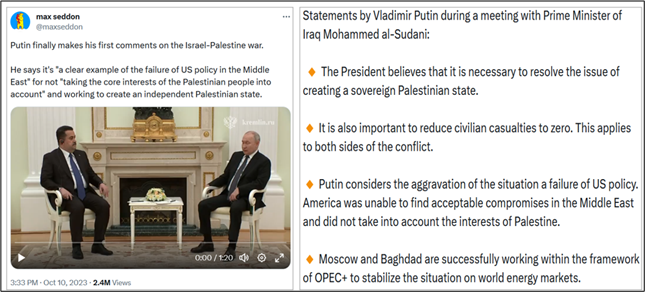
October 10, in Moscow, Deputy Defense Minister Aleksandr Fomin held talks with Ambassador of the Lebanese Republic to the Russian Federation Shawki Bou Nassar. During the talks, the sides discussed topical issues and perspectives of bilateral military and military-technical co-operation between Russia and Lebanon. The sides exchanged views and assessments on the current situation related to the Palestinian-Israeli conflict. Both officials noted that the Palestinian-Israeli conflict can be solved exclusively by political and diplomatic means.
Russia has taken a balanced position on the Palestinian-Israeli conflict and stays impartial in its dialogue with both sides, Kremlin Spokesman Dmitry Peskov said, October 11. “We have long, historical ties with the Palestinians and we have a long-standing relationship with the Israelis; mutual concern for safety of the millions of our nationals who have relocated to Israel unite us,” Peskov maintained. He insisted that Moscow should not show favoritism to either side. “Only then will we be entitled the right to play a role in settling the conflict, and Russia can and will play a role in resolving it,” he surmised.
Russian President Vladimir Putin held a phone talk with Turkish President Recep Tayyip Erdogan, on October 11, to discuss measures to ease tensions and they voiced concerns over targeting civilian settlements.
October 14, the number of Russian citizens killed as a result of the attack on Israeli territory by radicals from Hamas movement has risen to 16, eight compatriots are currently listed as missing, Marina Ryazanova, spokeswoman for the Russian Embassy in Israel told.
Putin’s comments regarding ongoing conflict, October 11:
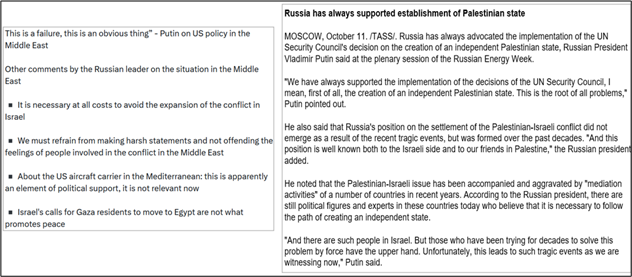
Israel has right to defend itself, but independent Palestine must be created — Putin
October 13, Putin said at the CIS summit: Israel has been brutally attacked but a settlement will be possible only through the establishment of an independent Palestine. Russia proceeds “from the postulate a negotiated solution to the Palestinian-Israeli conflict has no alternatives.”
Conclusions
I would like to put this conflict in another perspective, where the dichotomy of the situation can be encapsulated this way:
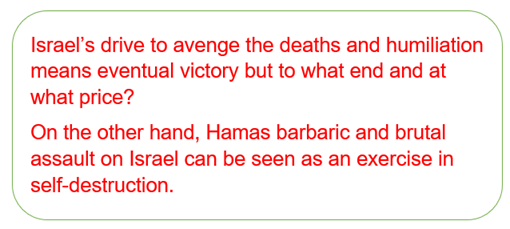
… and all this inequation lying on the surface of “eternal enigma” of two religions and the holy city Jerusalem. This is absolutely the most difficult international issue to be solved in today’s world.
But returning to reality…
Today, Israel is preparing the ground operation of IDF in the Gaza Strip but at the same time the risk of wide conflagration is getting very high.
At the same time, Biden ordered USS Gerald Ford Carrier Strike Group (CSG) to hover off the Israeli coast and a bit later another carrier group. The last time the United States did something like this was in 1983 but that did not turn out well for the Reagan Administration.
The blunder of Israeli security services will likely have big consequences for Middle East stability in the months and perhaps years ahead. Hamas has cemented its place among many Palestinians and Arab populations at large as the avenging angel of anti-Israel resistance. It has far outstripped the Palestine Liberation Organization (PLO), which governs the West Bank but has stood by idly as chaos engulfed Israel’s south.
Israel plans to restore its regional power by crushing Hamas. It is amassing thousands of troops for a ground offensive to do so. In preparation, it is bombarding the Gaza Strip with hundreds of missiles a day. So far, the US is supporting Israel’s effort to punish Hamas and accepting the damage it will do to Gaza residents and the enclave’s infrastructure. Israel may nonetheless be worried that Washington’s tolerance for destructive revenge could have its limits, even as Hamas is being destroyed.
If there is a lesson to be drawn from the current Gaza war, it is that history repeats itself: hardliners on both sides resume the cycle of revenge on each other. This cycle has been going since the establishing of Israeli state 1948.
If anything, the reinforcement of hardline positions together with the unnecessary brutality and harshness of both sides, has produced a conflict with an unprecedented disregard for the lives of the other. The current sledgehammer violence by both parties will not achieve preferred results and likely only harden positions, like in so many previous events.
As retired IDF Major General Itzhak Brik warned that “should a regional war break out and we are not prepared for it, the catastrophe will be hundreds of times greater… A military operation in Gaza can degenerate into an all-out war on five fronts.” General Brik referred to a multi-front war involving not just Hezbollah and Lebanon, the West Bank, Syria, and Iran but also Israeli cities and towns. “The next war will feature both very difficult battles on land and very difficult attacks from the air. But we’ll face the biggest catastrophe inside the country, as tens of thousands of armed Arab rioters will run throughout the country and we hadn’t prepared for this,” the former military officer added.
The silver lining is that a minority of voices on both sides of the divide are distancing themselves from the atrocities committed in the fighting and the bombings. This gives a tiny hope for possibility to find a way out of the current nightmare. What is new is that some moderate voices elsewhere in the Middle East have emerged at a time of heightened emotions and rallying around the flag.


